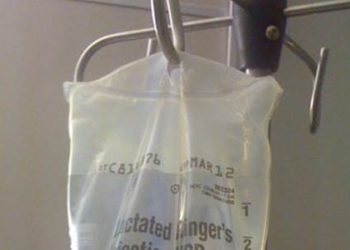The CORTICUS trial: Hydrocortisone in septic shock [Classics Series]
Image: PD
1. There was no significant difference in mortality between patients with septic shock receiving low-dose hydrocortisone compared to placebo
2. Hydrocortisone therapy reversed shock more quickly, but resulted in more cases of superinfection
Original Date of Publication: January 10, 2008
Study Rundown: Recommendations that patients with septic shock be treated with low-dose corticosteroids were based on a limited set of evidence and largely dependent on one larger trial. Although insufficiently powered, the CORTICUS study was the largest trial to date investigating the use of hydrocortisone in patients with septic shock. The results of the study point to an absence of effect of hydrocortisone therapy in patients with septic shock and suggest that response to a corticotropin test is not a useful prognostic factor for response to hydrocortisone.
In sum, hydrocortisone therapy did not reduce mortality in this group of patients with septic shock and therapy may be associated with increased incidence of superinfection. Response to a corticotropin test did not indicate which patients were more likely to respond to hydrocortisone therapy.
Please click to read study in NEJM
In-Depth [randomized, controlled study]: In this randomized controlled trial, published in NEJM in 2008, 499 patients with septic shock were randomly assigned to receive low-dose hydrocortisone therapy or placebo. All patients were assessed for a response to a corticotropin test. The primary end point was the rate of death at 28 days in patients without a response to corticotropin. There was no significant difference in the primary outcome between the hydrocortisone and placebo groups. There was also no significant difference in the rate of death at 28 days in patients who responded to corticotropin, nor was there a significant difference in overall deaths between the two study groups. Time to reversal of shock was shorter in the hydrocortisone group than the placebo group (3.3 days versus 5.8 days for all patients). There was a higher incidence of superinfections in the hydrocortisone group, including new episodes of sepsis and septic shock.
By Adrienne Cheung, Andrew Cheung, M.D.
© 2013 2minutemedicine.com. All rights reserved. No works may be reproduced without written consent from 2minutemedicine.com. Disclaimer: We present factual information directly from peer reviewed medical journals. No post should be construed as medical advice and is not intended as such by the authors or by 2minutemedicine.com. PLEASE SEE A HEALTHCARE PROVIDER IN YOUR AREA IF YOU SEEK MEDICAL ADVICE OF ANY SORT. Content is produced in accordance with fair use copyrights solely and strictly for the purpose of teaching, news and criticism. No benefit, monetary or otherwise, is realized by any participants or the owner of this domain.







